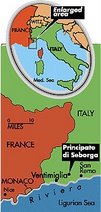A bomb, from the second World War, discovered inside a wall of a house in Seborga few days ago was discharged on Wednesday morning, 5 March.
The town held its breath for at least an hour. To dislodge the bomb which had been there since it landed on 9 September 1944, a team of military experts (Engineers/Sappers) was called in from the Alpina Torinese Brigade. They took the shell to be detonated at Mount Nero, near the place called: “Passo del Bandito”.
The town held its breath for at least an hour. To dislodge the bomb which had been there since it landed on 9 September 1944, a team of military experts (Engineers/Sappers) was called in from the Alpina Torinese Brigade. They took the shell to be detonated at Mount Nero, near the place called: “Passo del Bandito”.
The whole operation started just before 10 am. Beside the army, the Carabinieri (Italian Military Police) from Bordighera and members of the Emergency Services of Seborga-Vallebona and some volunteers from the local Red Cross were also called to guarantee the safety of the operation.
The shell had not exploded during a bombardment made by the Germans in the area which had sought to uncover a group of partisans whom they suspected were hiding in Seborga.
Indeed the five members belonging to the Resistance group were found and executed. Among them were also two young girls, 18 and 20 years of age.
That day six other people died: five members of a family from Perugia and an old person who did not stop at the “alt” command because he was deaf and was shot dead on the spot by a burst from a machine gun.
For the entire time, necessary for the removal of the shell, some houses were evacuated during the morning: in particular the house of Giuliano Fogliarino, owner of the flat in which the bomb was embedded in the wall for more than 60 years, and some houses near by.
Fortunately the children of the local school were not present on that day because they were on an excursion but to make the retrieval difficult, the shell was embedded in the wall at eight metres from the ground. A small mistake could have caused a disaster.
The knowledge of the experts made the dislodgement of the shell possible in just 15 minutes. Then the bomb was transported by the military in a isolated area called “Passo del Bandito”, on the mount Nero: a place considered ideal for such an operation as it is far away from houses and people. (Lorenza Rapini - La Stampa)



